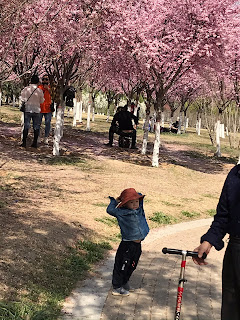Crossed the bridge: What is China like post-Corona?

Several of you have asked us for updates on life in China with the virus. I’ve resisted because I didn’t want this blog to be about some crazy virus that has upended the world -- especially given the fact that neither Dave nor I are experts in this. However, looking from a distance at what’s going on in the US, I often wonder why our experience was so different from my friends and colleagues in the US. So, I’ll share, if you find it useful. I also hope that this post will offer some sense that you can get through this. Although my title suggests we’ve “crossed a bridge” and we are “post-corona,” there are still things that have irreparably have changed. I suspect the same will be true for you all in the US. First, how are things now? In our area, cases have dropped off significantly. 8 new cases in the past three weeks; none where we live. As a result we are seeing a lot of relaxed rules. No temperature taken at our compound, and when we pulled out our

